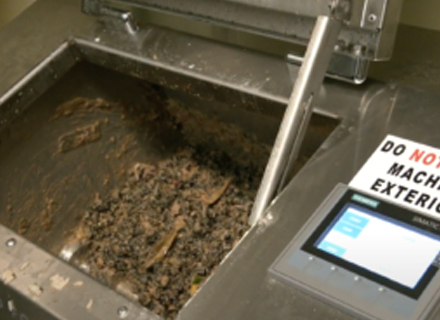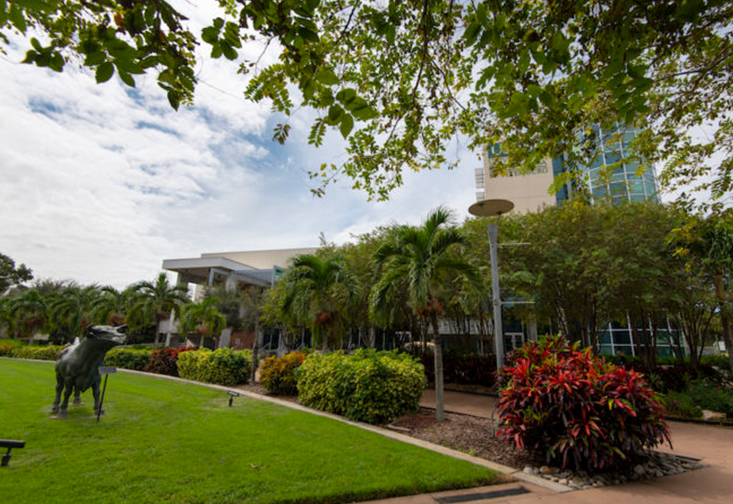With many public and private institutions vowing to scale back their carbon footprint, USF’s St. Petersburg campus is accelerating its commitment to sustainability through a series of initiatives designed to decrease emissions, grow green infrastructure and continue its stewardship of the environment. Led by sustainability planner Winnie Mulamba, who received her master’s from USF’s Patel College of Global Sustainability, the projects engage students in programs that will teach them career skills while leaving a lasting impact on the campus community.
“Students may learn about sustainable practices in class but they don’t always participate in projects that provide them with real-world professional development skills,” Winnie said. “We wanted students to really gain something valuable from these projects and provide them with opportunities to give back.”
Sustainability is a guiding principle for Winnie, who joined the Facilities Department in January. As part of her responsibilities as the campus sustainability planner, she tracks emissions data, enhances coordination between student environmental groups and builds partnerships that drive sustainability on campus and in local communities.
Working with student groups like the Student Green Energy Fund (SGEF), which implements large-scale sustainability and alternative energy projects on campus, Winnie is helping to initiate several campus-wide projects that include:
- Cataloging and mapping trees;
- Exploring the feasibility of green roofs and walls; and
- Creating a zero waste campus
Partnering with the City of St. Petersburg and USF’s Tampa campus, the tree inventory project will see students identify, measure and catalog campus trees. The goal is to create a map and database featuring information for each tree, which will inform future plans to diversify tree populations and expand canopy cover across campus. The results will supplement the City of St. Petersburg’s own tree inventory program.
Brianna Douglas, a junior biology major and SGEF’s vice chair, who is leading the tree inventory project, said, “Natural resources won’t last forever and it’s important that we begin taking steps to preserve them. I’m hoping that my team will gain a better understanding and appreciation for the campus ecosystem, and that we’ll get more people interested in sustainability and preservation of our environment.”
From 2016 to 2018, faculty and student researchers at USF’s Tampa campus have conducted their own inventory of nearly 10,000 trees. Winnie has arranged for some of those researchers to help train students in St. Petersburg.
“When people learn from their peers, it’s often in more informal settings and on a more personal level,” Winnie said. “This can make it easier to digest the information.”
The green roofs and walls project will explore the possibility of installing plant-covered infrastructure on select structures around campus. Both aesthetically pleasing and environmentally friendly, “living” structures have been shown to absorb rainwater, insulate buildings, decrease urban air temperature and create beneficial habitat for wildlife. Students involved in the project will perform a variety of tasks including reviewing state and local policies on green roof systems, identifying plant species best suited for the project, determining financial incentives and working with professionals to design green infrastructure for function and maintenance.
For Jewel “Min Min” Kelly, a freshman biology major and chair of SGEF, who’s leading the living infrastructure initiative, the project offers students the chance to combine their individual strengths towards promoting sustainability on campus.

In 2019, SGEF installed the ORCA biodigester, which turns food waste generated on campus into fuel.
“One of the great things about being on a team that works towards a common goal is that you have the opportunity to utilize everyone’s fullest potential,” she said. “There’s power in numbers, and even if the project may seem small by comparison to others, small changes can be made to cause ripple effects throughout the whole community.”
Shortly after assuming her role as sustainability planner, Winnie began to explore ways to eliminate waste on campus. Creating a zero waste campus will help progress that goal through the development of a comprehensive waste management plan. Students will help gather information concerning current waste management, research local recycling methods, predict future waste and implement strategies to bring campus waste down to zero.
Waste has a significant impact on environmental, economic and social sustainability. By decreasing the amount of waste generated on campus, Winnie hopes to position the university as an even more sustainable institution.
“As a university, we can lead the way in reducing waste through on-campus innovations around waste and holistic approaches to systematically refuse, reduce, re-use, repurpose or recycle the volume of waste and materials we generate,” Winnie said. “Not only will this help reduce our greenhouse gas emissions associated with waste, but we will also be contributing to making the world a better place for future generations.”
